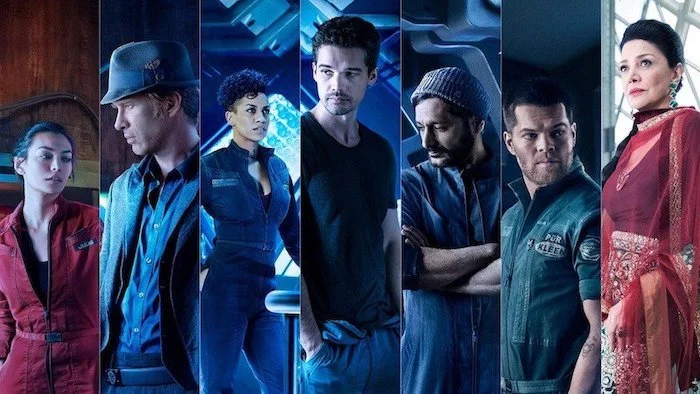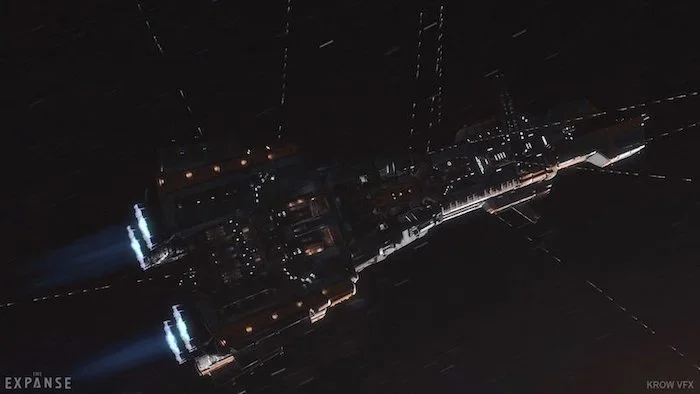‘The Expanse’: Season One Review
Image Source: The Expanse Lives
In the world of cinematic science-fiction, Star Wars and Star Trek dominate the collective mind of the body popular. Others out there deserve to be counted among the best science fiction. One of those is The Expanse. Based on James S.A. Corey’s titular series, it’s a hard sci-fi show about political tension within the Sol System between Earth, Mars, and the fringe population of the Belt (the asteroid belt between Mars and Saturn) and the outer planets, vaguely governed by a self-made political body known as the OPA (Outer Planets Alliance).
The Expanse starts with a blurb about the situation between the three powers, setting us up for the first episode’s escalating inciting incident that spirals everything in the series. It revolves around salivating the powers that be over the reason for the inciting incident: the discovery of an extrasolar organism. The discovery of this organism changes everything humanity knows about life, something all parties with the resources capable are eager to take advantage of, without regard for those caught in the wake of their ambition, in typical human fashion.
RELATED:
Looking back on The Expanse, one line sticks out to me the most in the six seasons of The Expanse, through all the brilliant dialog, action, and character arcs. In season five, Bull, Fred Johnson’s Chief of Ops on Tycho Station, played fantastically by José Zúñiga, turns to his boss and says, “You know what your problem is…you think because someone’s the underdog, that makes them the good guys.” The spectacle of The Expanse is its ability to subvert expectations, and no other line in the show does a better job of doing that. It’s the show’s strongest quality, starting in season one.
Compared with the rest of the series, season one follows an expected path in the sense that it’s mostly a setup, and — distinguishing it from other adaptations from books — it actually encompasses only the first half of the introductory book, Leviathan Wakes. In the ten episodes of the first season, the bulk of the story is dedicated to unraveling the mystery behind the destruction of the Canterbury that sparked the system-wide conflict into overdrive. The show was frequently compared to Game of Thrones for its political storylines, and though Game of Thrones was not the only show to weave plot lines and arcs in and out of each other, it was an apt description. All characters are part of three interweaving storylines that twist around each other until at least two are pulled together by the end of the first season into one coherent line.
Image Source: Filmvore
Holden (Steven Strait), Naomi (Dominique Tipper), Amos (Wes Chatham), and Alex (Cas Anvar) are right in the thick of the fallout from the power plays for the control of the Protomolecule, the extrasolar organism everyone’s vying for. Detective Miller, played by Thomas Jane, catches on to why the Canterbury was destroyed until his trail leads him onto the same path as Holden and the others. Meanwhile, back on Earth, Chrisjen Avasarala, played by the indomitable Shohreh Aghdashloo, rides the political waves surrounding the situation to avoid a war. Her path touches the others briefly when she and the UN leadership think he’s the one trying to draw everyone into a war. She talks to one of Holden’s mothers to better understand the man they ordered a hit on, only to come away with the feeling they have the wrong guy, and the mystery deepens. It’s all told masterfully, leaving you on little cliffhangers as they switch between each arc.
Regarding production value, it’s one of the best shows SyFy put out. Sets are uniquely constructed to reflect the different cultural environments and socio-economic situations of those within that culture. Martian ships are well-designed, state-of-the-art, and designed for war, matching the descriptions of Martian culture through dialog. We don’t really get a look into Earth ships in season one, but we get plenty of shots of Earth, seeing the condition of the planet several hundred years from now. Manhattan Island is surrounded by massive sea walls to hold back the ocean that’s risen over the centuries of our neglect of the environment. Ceres and Eros are dingy and run down, portraying the awful situation the Belters are in, which goes back to that quote from Bull. You can’t help but feel for them, underdogs, and as the anger for their situation builds, you can’t help but feel that deep tug at your conscience where you hesitate to condemn any of the actions OPA members take during the series.
Image Source: Fandom
One of the biggest draws for the series was its technical achievements. The show, inspired by the books, is called hard sci-fi. Technology and space travel is restricted to physics as we understand it. An advanced ship drive called the Epstein Drive allows for faster travel between planets, but the faster they go, the greater the g-forces on the body. One thing the early seasons slightly ignore is travel time. Everyone knows space is full of vast distances between celestial bodies. Even with these advanced drives, the length of some trips is long. We’re talking weeks. The show makes it look nearly instantaneous, especially communication. Later seasons do a better job, but watching season one and later seasons in a binge can bring these differences to light.
However, what they do an excellent job of throughout the series are low-to-zero G scenes. Artificial gravity doesn’t exist in this show. Simulated gravity is generated by a ship’s drive or the spin gravity of a station or dwarf planet like Ceres. If the drive shuts down, everyone’s on the float, and you can tell when the drive is off because of everyone’s magnetic boots making their tell-tale clicks as people walk around. These small technical details are what help sell the believability of the show.
It’s not restricted to the visuals. James S.A. Corey is actually a pseudonym for the two writers who wrote the books, Daniel Abraham and Ty Franck, who were involved in every aspect of the show, and it comes through in every other aspect. Nothing appears in the show that isn’t addressed later. Chekhov’s Gun is satisfied at every turn, and it’s so well done that some are seeds laid now only to sprout in seasons five and six.
Image Source: IGN
All said and done, the first season isn’t perfect. But can we hold a first-season stigma against it, though? Is it too much to expect perfection from first seasons? Every show’s first run is a gamble, and sure, there are shining examples of the successes, like The Last of Us. But every show has to start somewhere, especially for those that are not adaptations of wildly popular video games. Looking back at a season after the series’ run brings new things to light and illuminates clues laid early that don’t bear any fruit for some time. Do we evaluate it from the perspective of a first-time viewer or with the benefit of hindsight? I don’t think it’s possible to objectively review it without the influence of either of those perspectives.
Founded with the supervision of two excellent writers, their talent comes through in the writing and world-building. The slow burn of the first season, necessary to lay the groundwork, took a gamble on some relatively unknown acting talent, but as the season progressed, the talent of a few played like gravity on the rest and helped them find their footing to deliver a solid first season.
Rating: 8.5/10
READ NEXT:
Source(s): Amazon Prime Video
















